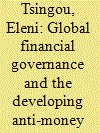| Srl | Item |
| 1 |
ID:
136149


|
|
|
|
|
| Summary/Abstract |
Though the list of reforms following the onset of the financial crisis is long, we should resist the temptation to view the emerging regulatory framework in terms of a paradigm shift. Many key features of the system, including the privileged position of financial institutions, remain unchanged. This is not merely due to obstruction or capacity shortcomings but can be explained by considering the sources of ideas and the governance setting. Ideas and policy programmes for reform were generated by a policy community also responsible for shaping the pre-crisis governance framework. Moreover, the ideas and preferences of these players are moulded by their transnational interactions and the club-like mechanisms in place for determining what (and who) is to be included in discussions. These settings have produced policy programmes that helped address the immediate, ‘fast-burning’ elements of the crisis, but have so far failed to put together a comprehensive reform programme.
|
|
|
|
|
|
|
|
|
|
|
|
|
|
|
|
| 2 |
ID:
099891


|
|
|
|
|
| Publication |
2010.
|
| Summary/Abstract |
The developing anti-money laundering (AML) regime exhibits a specific, non-financial set of policy preoccupations. Yet it is important to examine AML from a global financial governance perspective as the regime essentially imposes controls on the movement of money. This article analyses the political, institutional and regulatory evolution of the regime and argues that it serves to address a need for action on a diverse set of public policy goals (corruption, drug trafficking or terrorism); to relieve financial centres in advanced economies from offshore competitive pressures; and, unintentionally, to shape private sector practices so as to consolidate the position of key market institutions. The article stresses that the achievements with respect to its goals remain modest at best in relation to its ambitions, while important side-effects raise concerns about its role, efficiency and legitimacy. It also examines the possibility that AML has been tacitly accepted as the price for capital mobility.
|
|
|
|
|
|
|
|
|
|
|
|
|
|
|
|